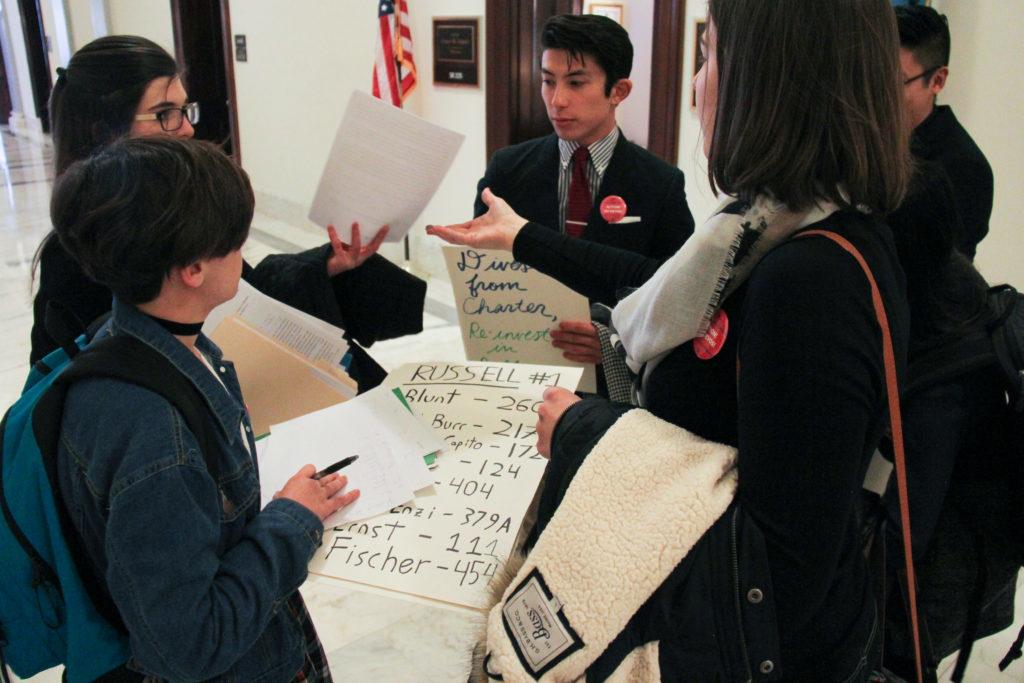Political activism has dominated campus since Inauguration Day, with student leaders saying they’re speaking out to stop the normalization of President Donald Trump’s policies.
Students have been involved in inauguration protests, the Women’s March on Washington and the protest on Trump’s Muslim immigration ban. Student leaders said maintaining an increased level of political activism will be crucial to their groups over the next four years as Trump’s administration continues to pursue far-right policies, like a disputed immigration ban and building a wall on the U.S.-Mexico border.
GW students have been consistently known for their political activism, but in a different way: Internships on the Hill are common and students may have volunteered for political campaigns. Leaders say Trump’s policies say they have noticed an increase in activism since Election Day.
Dean of Student Affairs Peter Konwerski said officials support students’ political engagement and debate.
Konwerski said leaders want students to know that the GW community embraces diverse people, perspectives, thoughts and opinions on campus.
“We want our students to be an active voice in advancing and debating pressing social problems in society that surrounds us here in the nation’s capital,” he said. “As a University, we encourage our students to listen to all voices and work to engage others in a civil, respectful way.”
We want our students to be an active voice in advancing and debating pressing social problems in society that surrounds us here in the nation’s capital.
In the past, most organized student activism focused on campus issues. In spring 2015, a Students Against Sexual Assault march on Rice Hall led to the addition of a sexual assault prevention training for first-year students.
Last March, more than 60 students led by the Progressive Student Union marched to Rice Hall to demand that Sodexo dining staff keep their jobs during the transition to a new dining provider. Still, as of the fall, as many as 15 dining workers had lost their jobs.
Levi Debose, the vice president of communications for the GW College Democrats, said recent turnout for the groups’ events have exceeded expectations. More than 50 students attended an event where they made posters for the Women’s March on Washington and about 150 members attended the march together. The group’s alternative to GW’s inaugural ball, the “Thanks Obama Ball,” also sold out, raising more than $10,000 for Planned Parenthood.
“We have a lot of things planned and it’s all about building our party to stand up and fight against Trump’s administration because there are so many things that they are already doing that is really a disgrace to the values that we stand for,” Debose said.
Debose added that CDs will host events during which students will call members of Congress to ask them to block Secretary of Education nominee Betsy DeVos and will host former Secretary of Labor and DNC chair candidate Tom Perez Feb. 7. The student group has reached out to all DNC candidates and plans to host debates about the race on campus to keep members engaged in the political process, Debose said.
“It was really amazing to see so many people, not only on this campus, but across D.C. as a whole, to be engaged and active and stand up for what they believe in,” he said. “It is a message that needs to be heard.”
Other student organizations dedicated to advocacy pledged to remain active in protesting federal policies that could restrict certain groups’ rights.
Ciaran Lithgow, the president of Allied in Pride, said although the student group has not been engaged in political organizing in the past, they are planning to meet with members to plan more active protests.
“I feel like for a long time Allied has been an organization that largely put on events – fun events – since there was not that much of a call to action,” Lithgow said. “Obviously that has changed with this administration.”
Lithgow said members of the student organization recently participated in a “creative activism” dance protest in front of the home of Vice President Mike Pence in Chevy Chase, who has been openly negative toward the LGBTQ community.
“We are in such a special place. I think all students at GW are, but we are in the heart of it all and I think that gives us a very unique jumping point for our activism,” Lithgow said. “I hope we don’t become complacent.”
The amount of political activism taking place now is something that we have not seen during our lifetime.
Jesus Montes, the vice president of the Mexican Student Association, said he has noticed increased support from both Latino and non-Latino students and officials since election night.
On election night, the Mexican Students Association met with the Mexican ambassador at the Mexican Cultural Institute. The group is now planning to host Hispanic elected officials and informational events for the Latino community in a “post-Trump America,” Montes said.
Trump has insisted that he will force Mexico to pay the costs of building a border wall along the shared border.
“Mexicans were the punching bag of this campaign trail,” Montes said. “The amount of political activism taking place now is something that we have not seen during our lifetime. Comparatively thinking, this is a movement something like the Civil Rights Movement.”
Allison Coukos, the public relations chair of the GW College Republicans, said members attended the inauguration ceremony and Snapchatted the event from GW’s official Snapchat account.
Coukos said regardless of who ended up occupying the White House, students would still be politically engaged.
“I think there has been a tense campus environment. Our goal is to foster an environment that can have open and productive dialogues. Students at GW and in D.C., by nature, are politically active and politically engaged. In the wake of the election this still holds true,” Coukos said.





